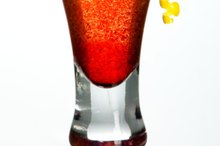The Effect of Asthma Inhalers on Breathalyzer Tests
Law enforcement and other authorities commonly measure suspects' blood alcohol level using the "breathalyzer" or breath alcohol analyzer test. The reading from a breathalyzer test can determine whether you lose your license or even spend time in jail. If you use an inhaler for asthma or breathing problems, however, a breath alcohol test can produce a false positive reading, even if you haven't had any alcohol to drink 1. If you have had some alcohol, using the inhaler can increase breathalyzer readings for some time after. Asthma inhalers and other compounds, called "interferents," can skew breath alcohol analyzer test results 2.
If you are experiencing serious medical symptoms, seek emergency treatment immediately.
How Breath Alcohol Analysis Works
Currently, most breath alcohol analyzer machines use a method called infrared spectroscopy. When you breathe into the breathalyzer machine, it captures your breath in a small sample chamber where beams of infrared energy shoot through it. Any compounds in your breath that contain a methyl group in their chemical structure---as alcohol does---absorb more infrared energy. The breathalyzer measures the amount of energy absorbed. When you drink alcohol, some of it is absorbed into your bloodstream. Your lungs then release a very small amount as you breathe. For every part of alcohol found in your breath, there are 2100 parts alcohol in the blood. Thus, in order to convert the amount of alcohol compounds in your breath into a blood alcohol level, the reading from your breath is multiplied by 2100.
- Currently, most breath alcohol analyzer machines use a method called infrared spectroscopy.
- When you breathe into the breathalyzer machine, it captures your breath in a small sample chamber where beams of infrared energy shoot through it.
Interferents
Drugs Which Can Affect Breath Alcohol Analysis
Learn More
Measuring blood alcohol level with a breathalyzer test causes problems because so many other compounds besides ethanol alcohol contain a methyl group. Asthma inhalers, one very common culprit, sometimes contain 30 percent or more alcohol that isn't absorbed into the bloodstream but is used as a propellant. Albuterol, the active ingredient in many asthma inhalers, also contains a methyl group and can trigger a false positive reading from a breath alcohol analyzer 12.
Length of Effect
In recent years, breath alcohol analyzer results came under fire in legal cases because of false positives caused by interferents. In some places, such as in Illinois, the laws regarding breathalyzer tests were changed to add prohibitions for ingestion of any foreign substances within 20 minutes of taking the test in order to reduce false positives. A 1998 study published in the Proceedings of the Western Pharmacology Society found that while non-drinking subjects who used an inhaler registered readings as high as 0.120 on a breathalyzer test, readings returned to 0.0 after 6 minutes. However, in subjects who had ingested some alcohol, the influence of the inhaler on breathalyzer scores continued past the 20-minute mark. The investigators recommend that if the subject has used any medication, a breath alcohol test shouldn't be done and a blood alcohol test should be used instead.
- In recent years, breath alcohol analyzer results came under fire in legal cases because of false positives caused by interferents.
- A 1998 study published in the Proceedings of the Western Pharmacology Society found that while non-drinking subjects who used an inhaler registered readings as high as 0.120 on a breathalyzer test, readings returned to 0.0 after 6 minutes.
Other Interferents
The Effects of Alcohol on Oxygen Absorption
Learn More
Newer types of machines coming onto the market now more accurately identify only ethanol alcohol when doing a breath test. However, if you're pulled over and asked to take a breath alcohol test, consider refusing the test and requesting a blood alcohol test instead if you've been exposed to any of these possible sources of false readings: Inhalers for asthma or breathing problems within 30 to 60 minutes; strong mouthwash in the last 10 minutes; dental adhesive; denture cleaner; industrial solvents (this can include working with lacquer or similar substances for multiple days, as the substances can be absorbed through your skin and show up in a breath alcohol test) 2. Also, if you're diabetic and have low blood sugar, you may have acetone in your blood. If you smoke or have been smoking heavily, a breathalyzer can misread acetaldehyde from cigarettes.
- Newer types of machines coming onto the market now more accurately identify only ethanol alcohol when doing a breath test.
- If you smoke or have been smoking heavily, a breathalyzer can misread acetaldehyde from cigarettes.
Missing Decimal Point
In the original 1990 case that made the breath alcohol analysis test legally admissible, an expert stated that the error rate for the machines in his testing was 2.3 percent. However, a later analysis of the data revealed the error rate to be 23 percent---a significant error that paved the way for widespread acceptance of and misplaced confidence in breathalyzer testing. If you do find yourself having a breath alcohol analysis done, let the investigators know about any factors that might affect your test results. If you have questions about the legal ramifications or are involved in a case where you think asthma inhalers or other interferents influenced your breathalyzer reading, contact a local lawyer 2.
- In the original 1990 case that made the breath alcohol analysis test legally admissible, an expert stated that the error rate for the machines in his testing was 2.3 percent.
- If you have questions about the legal ramifications or are involved in a case where you think asthma inhalers or other interferents influenced your breathalyzer reading, contact a local lawyer 2.
Related Articles
References
- Albuterol Inhaler: Impact on a Breath Test
- Asthma Inhalers Cause False Breathalyzer Results
- Taylor B, Rehm J. The relationship between alcohol consumption and fatal motor vehicle injury: high risk at low alcohol levels. Alcohol Clin Exp Res. 2012;36(10):1827-34. doi:10.1111/j.1530-0277.2012.01785.x
- Ferré S, O'Brien MC. Alcohol and caffeine: The perfect storm. J Caffeine Res. 2011;1(3):153-162. doi:10.1089/jcr.2011.0017
- Stornetta A, Guidolin V, Balbo S. Alcohol-derived acetaldehyde exposure in the oral cavity. Cancers (Basel). 2018;10(1):20. doi:10.3390/cancers10010020
- Hadland SE, Levy S. Objective testing: Urine and other drug tests. Child Adolesc Psychiatr Clin N Am. 2016;25(3):549-65. doi:10.1016/j.chc.2016.02.005
- Stewart SH, Koch DG, Willner IR, Randall PK, Reuben A. Hair ethyl glucuronide is highly sensitive and specific for detecting moderate-to-heavy drinking in patients with liver disease. Alcohol Alcohol. 2013;48(1):83-7. doi:10.1093/alcalc/ags109
- Fillmore MT, Jude R. Defining "binge" drinking as five drinks per occasion or drinking to a .08% BAC: which is more sensitive to risk? Am J Addict. 2011;20(5):468-75. doi:10.1111/j.1521-0391.2011.00156.x
- American Association for Clinical Chemistry. Ethanol. 2018.
- Cederbaum A. Alcohol metabolism. Clinics in Liver Disease. 2012;16(4):667-685. doi:10.1016/j.cld.2012.08.002
- LabCorp, Inc. Drugs of Abuse Reference Guide. 2007.
- National Institute on Alcohol Abuse and Alcoholism. Alcohol Metabolism: An Update. Alcohol Research & Health. 2007;30(1).









